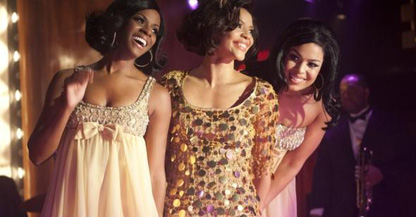|
|
Movie Review: SparkleBy Matthew HuntleyAugust 28, 2012
After Stix (Derek Luke), an up-and-coming manager, sees the girls perform and hears Sparkle sing one of her own songs, he’s convinced they have what it takes and immediately jumps at the chance to represent them. Soon enough, Sparkle, Sister and their middle sibling, Dolores (Tika Sumpter), become overnight sensations and we watch as all the usual plot developments unfold. During the movie, one thought kept passing through my mind: there’s got to be more to it than this. Surely Sparkle, in this day and age, can’t just be about the rise and fall of a music group. We’ve seen this premise hundreds of time, and in fact, this is a remake of a 1976 film of the same name and likely the same plot. But no, that’s really all it is, and while the movie isn’t exactly boring, it never aims to be higher than average. All the usual drama and conflicts ensue, including the sisters struggling to break free of their overbearing mother; or Sister descending into a life of substance and spousal abuse after she marries a local comedian named Satin (Mike Epps), who’s stricken with anger and frustration when he finds himself suddenly standing in his wife’s shadow. Through it all, Dolores is merely a bystander while Sparkle, the innocent virgin with the purest heart, stays straight so she can prove, in the end, that dreams really do come true. Despite all its conventions and clichés, I did find myself getting caught up in Sparkle. It’s bright, sensational and the music is captivating. The plot doesn’t require you to think very hard and shortly into the opening act, it’s obvious the film won’t showcase the strongest of performances, but it holds our attention, even if it is on a TV-movie level. Ultimately, this wasn’t enough for me, but it may be for some. One bright spot is Sparks, who’s radiant and enormously likable on-screen. The camera loves her and if she can sink her teeth into a more challenging script, she’s bound to have having a long career ahead of her in the movies. As for Houston, it’s unfortunate that her untimely death made Sparkle her last film (she too had a promising career in the movies). Granted, she does play the protective mother who eventually comes to the rescue and realizes her youngest daughter’s talent should be nurtured instead of discouraged. And it’s fitting, I suppose, that her character passes down the torch, which many will likely see as a case of art imitating life. But while this is sweet to think about and may bring Houston fans some closure, I still wished the movie to be more original and daring. In short, I wanted more reasons to care about what was happening.
|

|
|
|

|
Thursday, October 31, 2024
© 2024 Box Office Prophets, a division of One Of Us, Inc.


